Partners in Action

03 November 2025
Partners in Action
Speech by Datuk Mohamad Helmy Othman Basha, Group Managing Director of SD Guthrie and Chairman of the Malaysian Palm Oil Board (MPOB), at RSPO RT2025 – Shangri-La Hotel Kuala Lumpur, Malaysia, 3 November 2025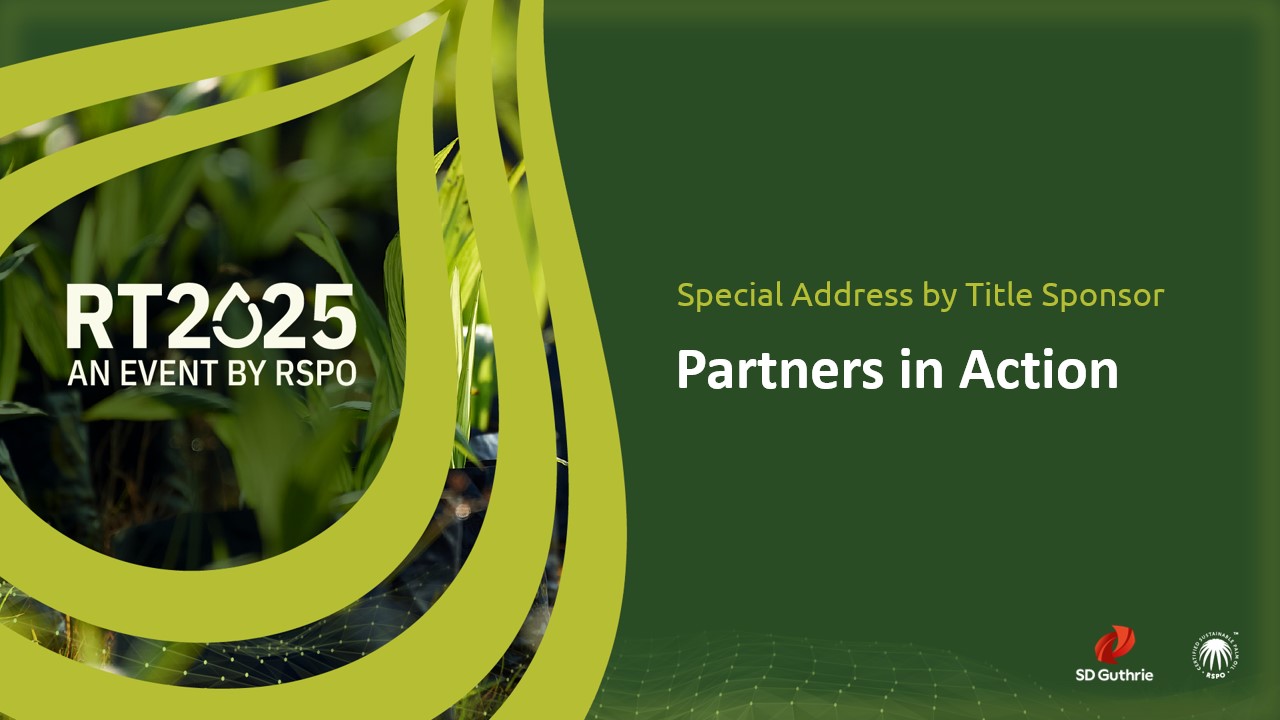
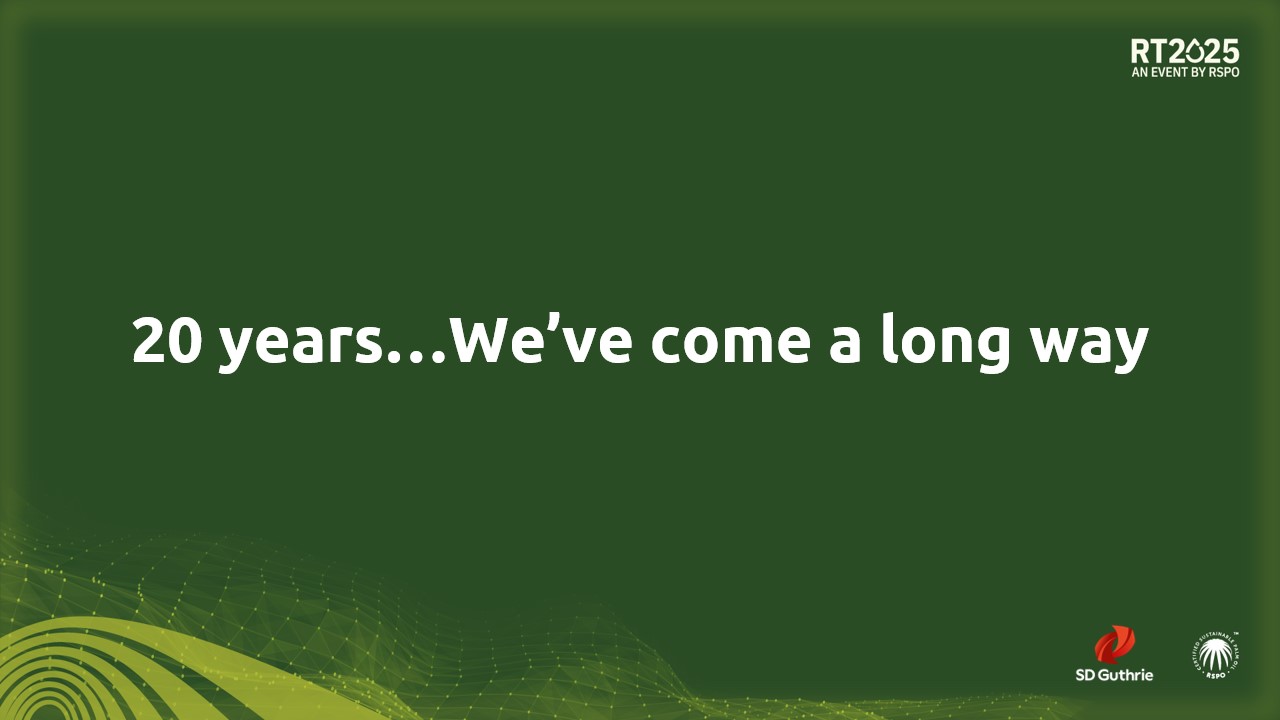
Good afternoon, ladies and gentlemen, distinguished guests, partners in the palm oil industry, friends.
For nearly 30 years, I have been privileged to work in the plantation industry, across estates, mills, and refineries in Malaysia, Indonesia, Papua New Guinea, the Solomon Islands, and Liberia. I was part of the generation that followed the pioneers, still breaking new ground.
Over the years, I have seen with my own eyes, the development of the industry – from the perspective of smallholders, small companies, large companies, communities, and nations. Ring side seats to witness the changes that the industry has brought – yes, negative sometimes, but mostly positive.
I chose the title of this speech “Partners in Action” because it fits with the RSPO’s theme for 2025, “Building the next 20: Sustainability in Action”.
Building something from the ground up takes skill, perseverance, and a clear sense of purpose. After 20 years, we have acquired skillsets that never existed before, and all major companies have at least one department that did not exist 20 years ago – the sustainability department. We have learnt how to persevere against the toughest of situations – my fellow planters will understand what I mean. While some of us here lived through those tough situations, some others also in this room, may have caused them. And yet, we are here today, together, … mostly, living our purpose – which is, to produce, and to support the production and use of certified sustainable palm oil.
At 20 years old, in most countries, the RSPO would be eligible to vote and have a drink. At 20, it is also old enough to do some soul searching. It has built itself from the ground up, because of the skills, perseverance and the sense of purpose that bound its members. It has lasted 20 years because of this partnership and shared vision.
To build on the efforts of the last 20 years, all of us here in this room, must work together towards a common goal. We all know that transformation is only possible when partners work together. For us, that means when growers, governments, brands, financiers, and NGOs come together around a shared vision: to make sustainable palm oil the norm, not the niche.
For partnerships to work, we must be honest with each other. We must be accountable. And we must support each other. I must be able to trust you, as you must be able to trust me.
Big word, isn’t it? Trust.
How does a grower show that it can be trusted. In a word? Traceability.
Twenty years ago, sustainability was a new language. Certification was experimental. Traceability wasn’t in the picture. Today, you can open an app and it’s all there at your fingertips. We’ve done that. All of us together. We have turned what was once a controversial crop into one of the most transparent and traceable commodities in the world.
So, we know how a planter shows good faith. But how would a food company show good faith? Show us, we can trust them? I’ll tell you how, By standing by us and supporting us. By speaking up and speaking to the truth. Yes, and also by calling us out when you need to, and working with us to correct situations that have gone wrong. Unfortunately, I can also tell you how you can show bad faith.
It is hard to accept that those whom we call our partners, some of whom are members of the RSPO, our allies in the sustainability journey – it is hard to accept that those with a seat in this room may choose silence or worse, distance themselves from the very product they claim to support.
This, ladies and gentlemen, is what I mean.
“No palm oil” label by RSPO Members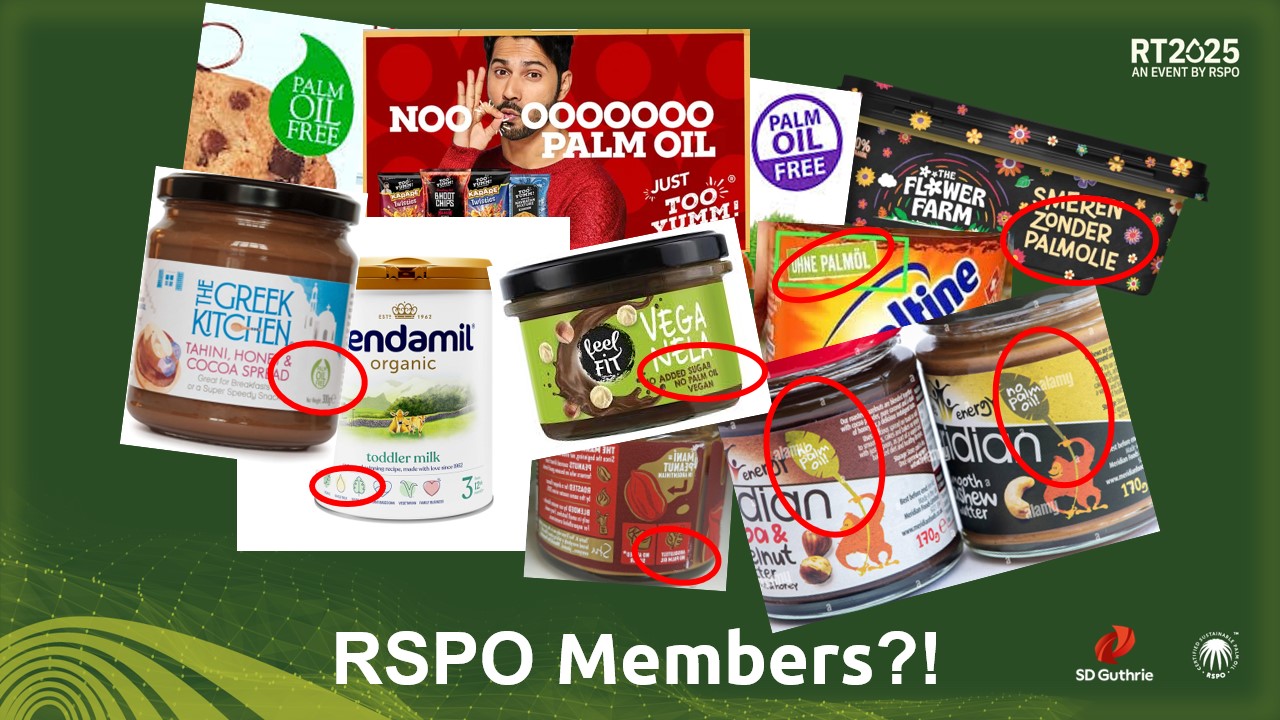
There are brands that sit with us at the same table, that claim to believe in sustainable palm oil — yet proudly sell products that say “No Palm Oil.”
What message does that send to consumers? What does it say about partnership?
If we are truly “Partners”, then our advocacy must match our membership. Our words must match our actions.
We cannot preach sustainability in this room but reinforce the old rhetoric that palm oil is bad. Make no mistake, when you advertise the absence of palm oil, what you are saying is, “this product is good, because there is no palm oil in it.”
Ladies and Gentlemen, to believe in Certified Sustainable Palm Oil is to defend it — consistently, publicly, and without apology. If you are a global brand, you can't hide by claiming your business in Spain is run independently from the one in Malaysia. Just like Guthrie cannot say our business in South Africa is independent from our business in Solomon Islands when it comes to sustainability.
I will be the first to admit, that we don’t get everything right all of the time. Nobody does. In fact, the learning curve is still pretty steep for some. But you must admit, that just as the RSPO has come a long way, so has the industry.
For years, palm oil was associated with deforestation. The images were powerful, emotional, and lasting. However, the narrative has shifted as the changing climate demands honesty. The truth is obvious – the problems the world is facing was never all about palm oil – despite the headlines of the past.
We all know that if every hectare of oil palm plantation in the world is returned to forest, the world would be much worse off. Deforestation would increase as less efficient replacement crops were planted to meet global vegetable oil demand. Socio economic challenges will befall thousands of smallholders and small companies in the producer countries, as they turn towards less financially rewarding crops.
Now, as the narrative seems to be catching up with the reality, we can focus on the real issues that need to be addressed.
What defines a responsible industry is not perfection; it is progress.
What defines a responsible industry is progress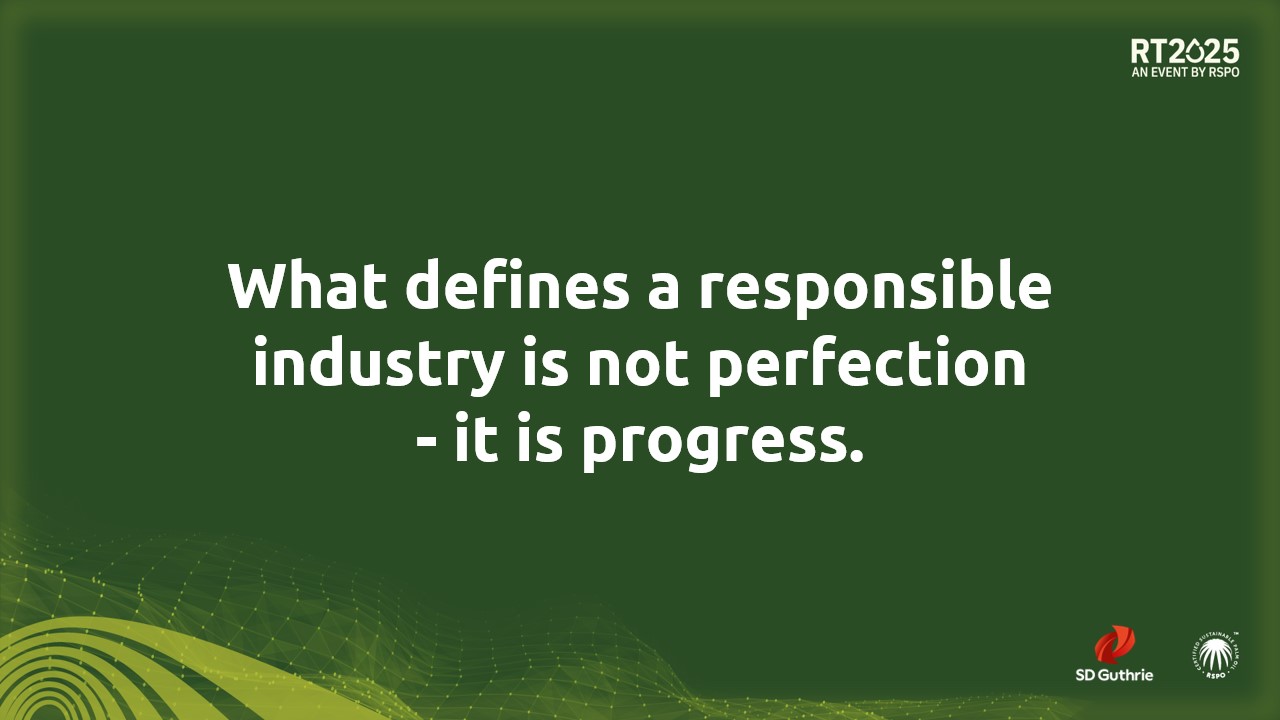
In the case of palm oil, that progress has been driven by regulations, by corporate NDPE policies, by satellite monitoring, by sheer hard work from growers on the ground — by the standards that the RSPO itself has helped shape. And yes, by those buyers who recognise the cost of all these efforts and agree to pay premiums.
To be clear, I am not saying that the industry did not deforest. We did. Neither am I saying that the industry is net zero. We are not. What I am saying is, all human activity affects the environment – mostly negatively. Thus, the singling out of one crop as the primary cause of deforestation, was at best disingenuous, and at worst, a crime against humanity. Because all those calls to ban palm oil for causing deforestation, allowed more serious damage caused by other industries to continue.
This is the data on deforestation…
Deforestation Trends in Indonesia and Malaysia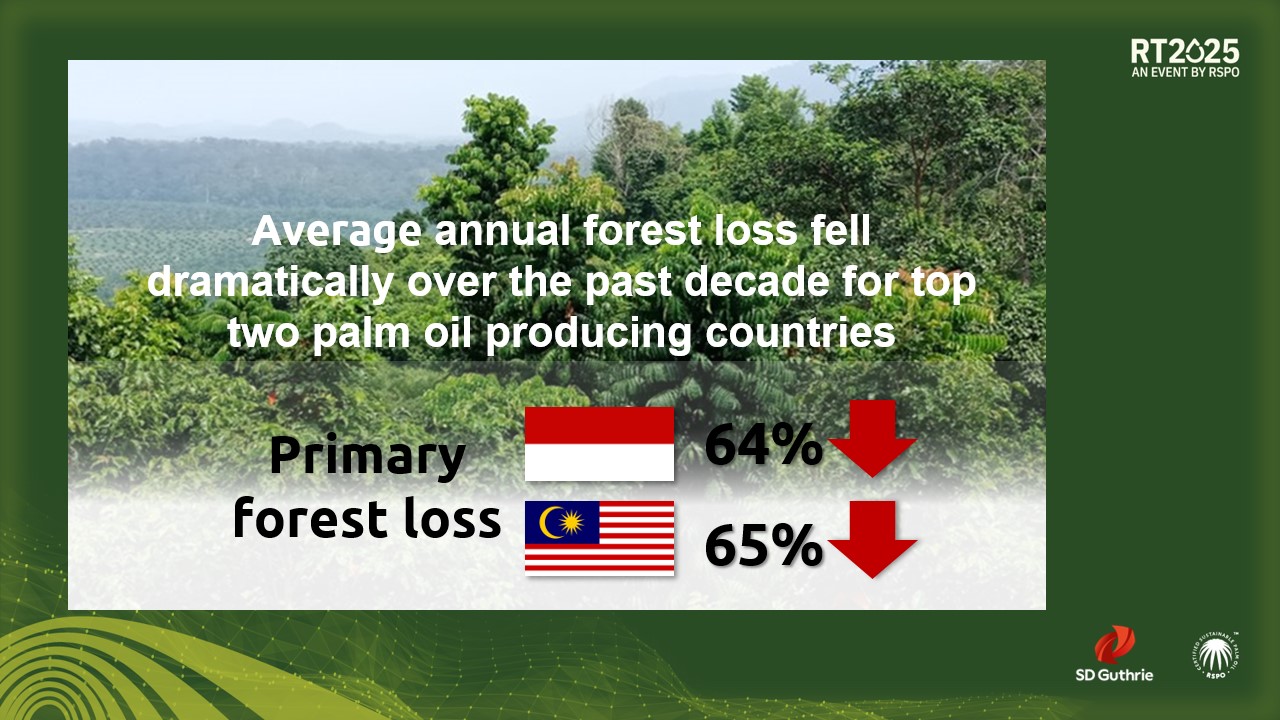
According to the World Resources Institute and Global Forest Watch, primary forest loss in Malaysia and Indonesia has dropped sharply over the past decade.
In Malaysia, it has fallen by more than 60% since its peak. In Indonesia, the trend has been consistent — year after year of declining deforestation, the lowest rates since records began.
Both countries have over 50% of forest cover – more than many rich countries in the world.
These are not empty claims. These are verifiable facts. Facts that too often get ignored and sometimes trivialised.
Take for example the EUDR. A record of declining deforestation and maintaining forest cover at above 50%, landed Malaysia a “standard risk” rating. And yet, other countries with worse track records and lower forest cover, were rated “low risk”. To some of us, it felt like the same old tune – victimise palm oil producers, so the others can continue to do what they always have done.
Applying a single standard for land use change is unfair. However, applying a more stringent standard on a poor or developing country is economic apartheid.
Deforestation cannot be considered in isolation. It has to be considered alongside economic development. The only equitable and ethical solutions for poorer countries are to allow them to use their natural resources and …. this is going to be unpopular … but hear me out … they should be allowed to lose some of their forest to stimulate economic activity for their people.
The quid pro quo? Every rich country that has less than 50% forest cover needs to step up and start planting. Or … they need to start paying underdeveloped nations to maintain their forests.
There is no other way.
Ladies and gentlemen, the hypocrisy needs to stop.
Over the past three decades, while palm oil was being painted as one of the great environmental villains, fossil fuel producers — whose emissions are the largest direct cause of climate change — often escaped equivalent moral outrage, despite having far greater, global-scale impacts.
When fossil fuel use is often excused in the name of ‘energy security’, sustainable palm oil is banned in the name of ‘deforestation’.
Thanks to all these double standards that developing countries cannot afford to fight against, a new challenge is emerging — one that affects global availability itself.
The relentless negativity towards palm oil has resulted in some markets pushing it away. And so, the anti-palm oil folk may soon get their wish – the world is already seeing the steady disappearance of palm oil from the global market. Indonesia, the world’s largest producer of palm oil by far, is turning inward.
Biodiesel Blending and Supply Impact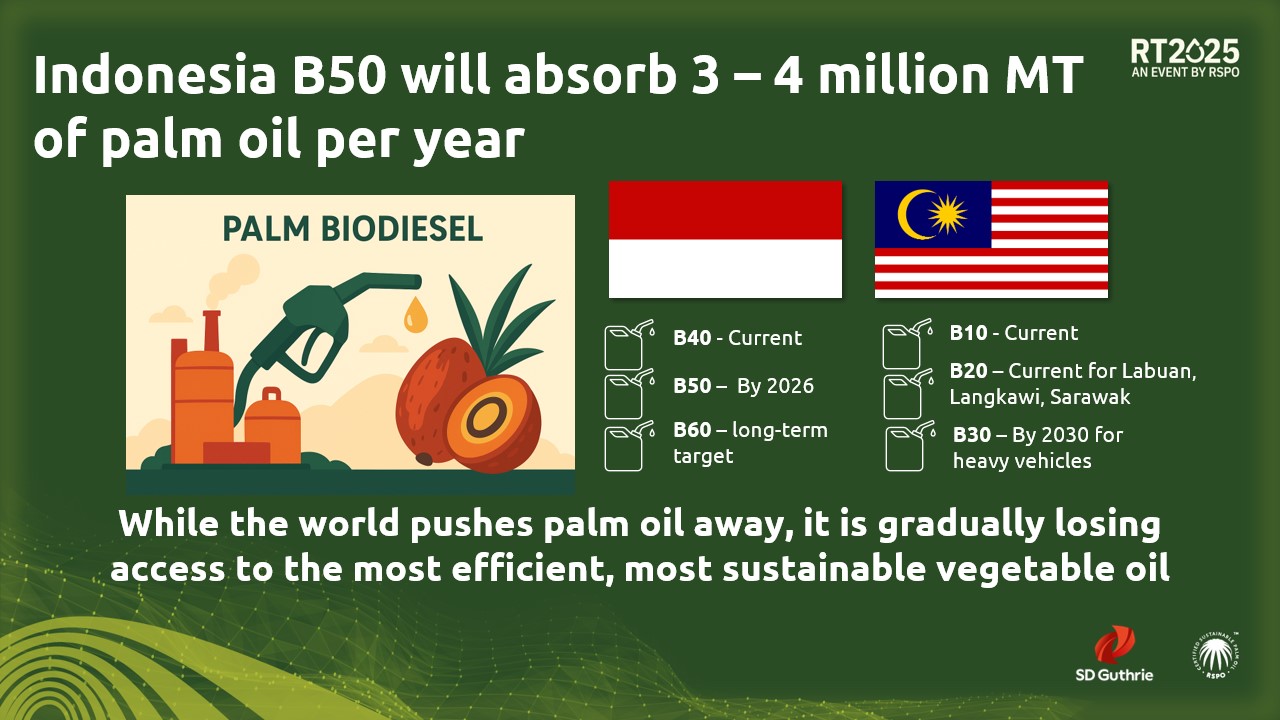
Indonesia is already running B40, with B50 on the horizon and B60 in discussion.
Malaysia is advancing toward B30.
Each increase in blending means more palm oil used domestically for energy — and less available for export.
Analysts estimate that if Indonesia reaches B50, that alone could absorb an additional 3 – 4 million tonnes of palm oil per year.
So, while the global North debates whether to “phase out” palm oil, the two biggest producers are blending it for fuel. Is this the outcome that the anti-palm oil lobby wanted?
The world is losing access to the most efficient, most productive, and most sustainably produced vegetable oil. What are they going to replace it with … and how will that replacement be produced?
It will be easy to say that Indonesia should not move to B50. Sure. But what choice did they have? Every government in the world today protects its own. The countries that were considered “leaders” and our betters, are also taking care of themselves.
Norway became rich on oil money and is still one of the largest exporters of crude oil in the world. Netherlands – a great agricultural country – has more farm animals than people. And … I won’t say anything about the United States. Every country takes care of its own. And Indonesia has the right to do just the same.
If the world continues to reject palm oil using one-sided, myopic, colonial thinking, it will pay the price — in food security, in affordability, in climate targets.
Ladies and gentlemen, now let’s talk about people.
Sustainability is not just about the environment; it is about lives too.
Just Transition for Our Smallholders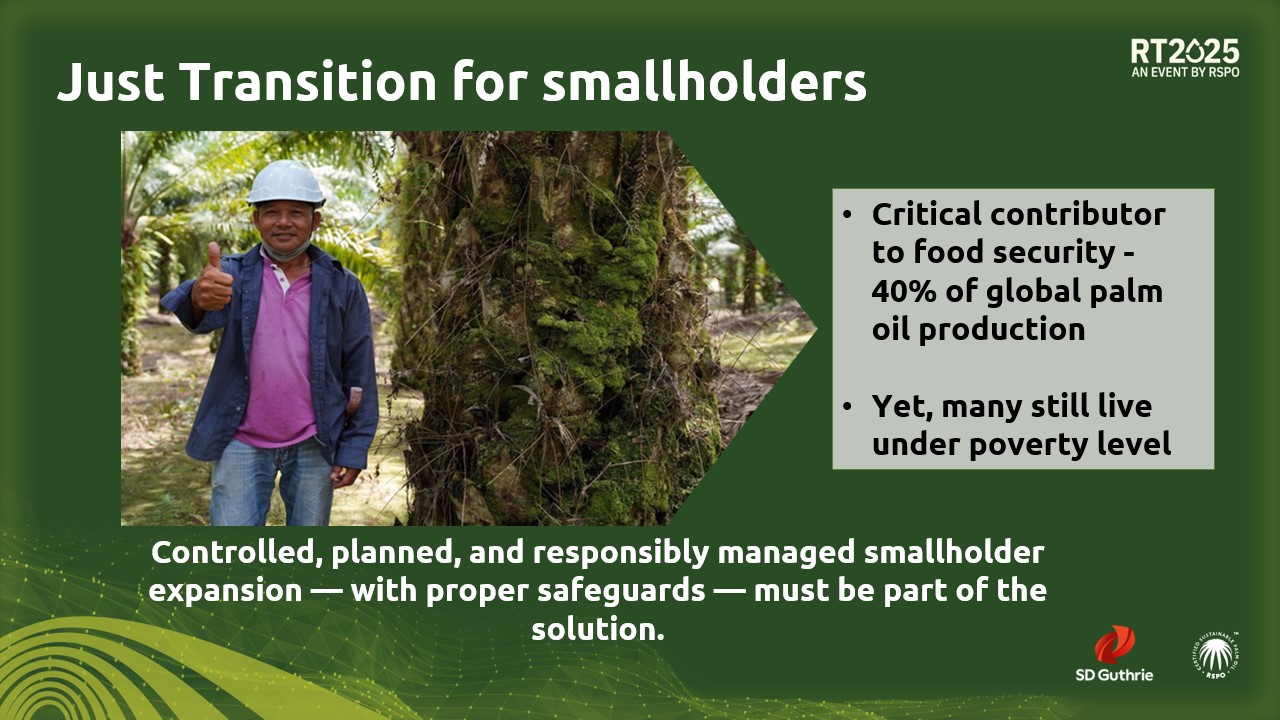
We cannot talk about partnership, without talking about our most important partners - our smallholders. They are the backbone of this industry — in Malaysia, in Indonesia, in Papua New Guinea, and beyond.
In Papua New Guinea for example, smallholders represent nearly half of all palm oil output. But unemployment remains high, and families still live below the poverty line. For the record, PNG has the 8th highest percentage of forest cover in the world. For many in this country, oil palm is the only viable livelihood. It pays for education, healthcare, mobility, dignity ... And it is the hope for a better life for their children.
If we deny them that opportunity — if we say “no expansion ever” — we are effectively saying to them: stay poor, stay behind. That is not sustainability — that is hypocrisy.
That is not what sustainability stands for.
It is our responsibility as members of the RSPO and for the RSPO itself, to find a way to allow the people of PNG and other countries like it, to find a balance between environmental integrity and social justice.
We must support smallholders to grow responsibly, not lock them out of prosperity.
Controlled, planned, and responsibly managed smallholder expansion — with proper safeguards — must be part of the solution.
So, how do we move forward? What does real partnership in action look like?
First, it means standing up, not standing by.
Defining True Partnership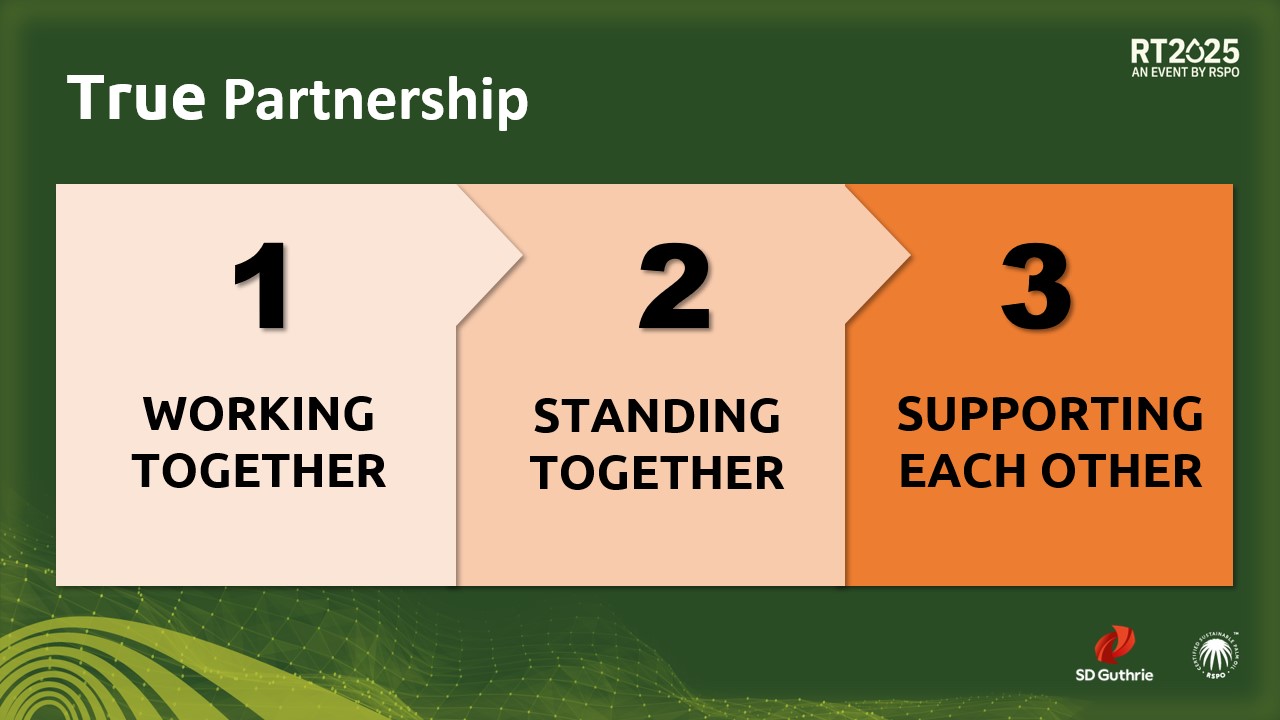
When we see misinformation, we must call it out — not stay silent in fear.. We know what that fear looks like, because we have seen it.
Second, it means telling our story — loudly, visually, emotionally. Facts are powerful, but faces persuade.
Third, it means not betraying our partners.
Our presence here means, we have all signed up to a common purpose. None of us should betray that trust. If we do, we do not deserve a seat at the table.
And finally, it means inclusion — ensuring that smallholders, communities, and workers are part of this journey, not victims of it.
I stand here not just as the head of one company, but as part of an industry.
Here is a fact. Guthrie is one of the largest producers of the most productive and sustainable edible oil on Earth. The best part? We are not alone. There are many in this room who do what we do, every day, day and night. I salute you.
And I make no apology for calling out the hypocrisy of some countries or some members of RSPO. You may have a Cause to champion now and I am a firm believer of that Cause. But without addressing the issues that I have raised, you will soon find that your Cause and RSPO along with it may become irrelevant.
We know that palm oil — done right — feeds billions, sustains the livelihoods of millions, and protects more forest per tonne of oil than any other crop.
Let’s not allow others to define us. Let’s define ourselves — truthfully, transparently, and together.
This is what Partners in Action truly means: standing shoulder to shoulder, telling one story — the right story — for the future of sustainable palm oil.
Thank you.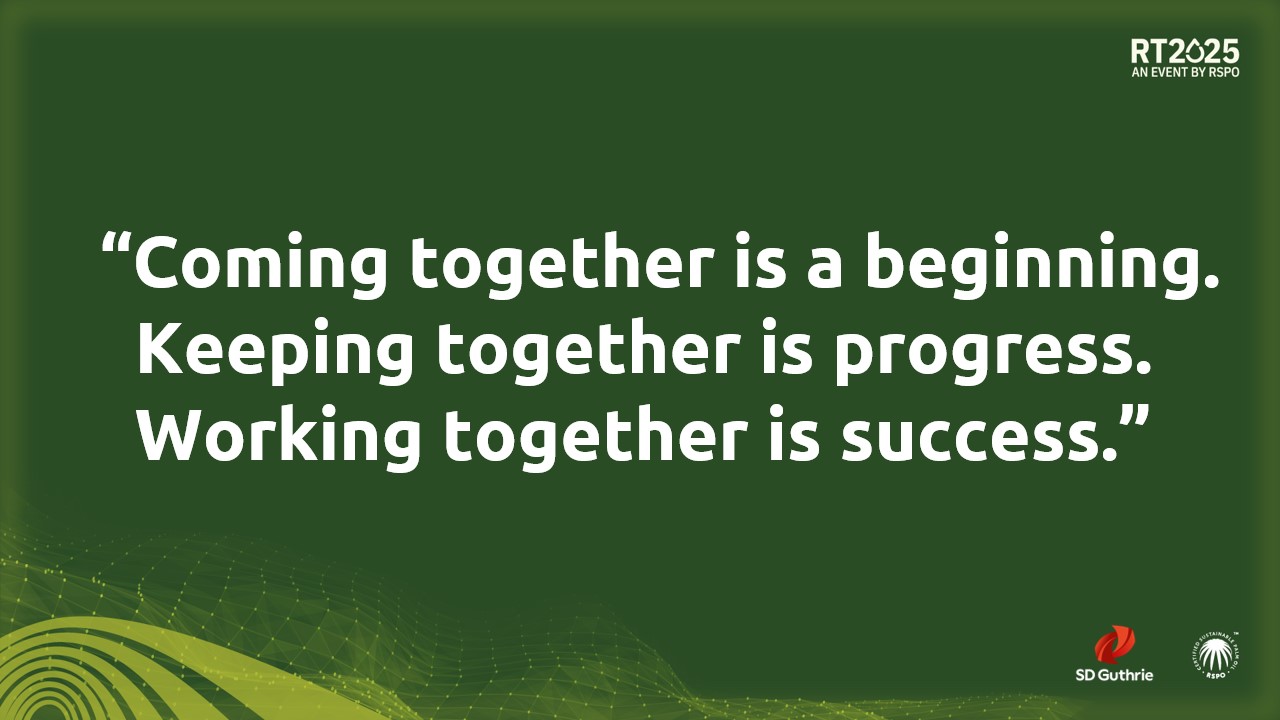
To download PDFs:
English
Related Post

31 October 2025
Carey Heritage Ride Wraps Up a Vibrant October Celebrating Sports and Biodiversity
Read More
17 October 2025
SD Guthrie’s Carey Heritage Run 2025 Marks a Milestone in Nature-Inspired Community Engagement
Read More
14 October 2025

